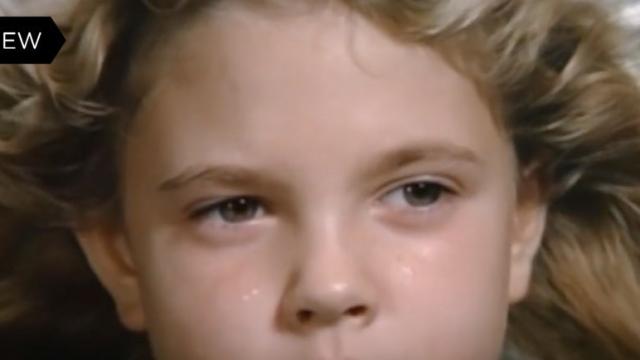Because all things Stephen King never go out of style — and because pop culture never tires of stories revolving around kids with spooky powers — there’s a new Firestarter movie arriving in May. With that in mind, we figured now was as good a time as any to hop in the rewind machine and watch tiny Drew Barrymore start infernos with her mind.
And we do mean tiny. Made just two years after her precocious breakout as Elliott’s little sis in E.T. The Extraterrestrial, Firestarter stars an eight-year-old Barrymore as the reluctant pyro-kinetic Charlie McGee. In the forthcoming remake, the character’s age is bumped up to 11, adding a few crucial years that enable her to be a tween capable of embracing her sinister powers, which is what the film’s trailer suggests will happen. (The trailer also contains the word “superhero,” a concept which never comes up in the 1984 film, despite the fact that Charlie’s powers have a decidedly X-Men quality.)
By contrast, the Barrymore film — which is directed by Mark L. Lester, whose other credits include the Arnold Schwarzenegger-starring Commando, which oddly enough has some thematic parallels, and the Linda Blair-starring Roller Boogie, which does not — is incredibly melancholy. It is the tale of a sad little girl born with a destructive “gift” that’s ruined her young life, and who dreams of nothing more than being a normal kid like everyone else.
Naturally, there are villains galore, as if Charlie and her dad, Andy (David Keith, giving off secondhand Kurt Russell vibes), weren’t already sympathetic enough. The first is the doctor (Freddie Jones) who runs a dicey experiment testing the mysterious “lot six,” which we soon learn is a “pituitary extract, a powerful painkiller hallucinogen” found to be “responsible for the occasional flashes of psi-ability.” This exercise in pseudoscience is where broke students Andy and Vicky (Heather Locklear) meet, and where Andy becomes capable of “mental domination” — basically, he can grimace, clutch his temples, and force people to whatever he wants. Despite the fact that “the Shop,” the sinister government branch behind all this, is constantly hovering around, Andy and Vicky (who is telepathic) marry and produce Charlie, whose innate “psi-abilities” become so worrisomely powerful that Vicky is murdered and Charlie and Andy are forced to go on the run.
Frankly, it was scarier when Stephen King made the heroine of Carrie a telekinetic for no reason at all — and gave her high-school angst to contend with on top of that — but Firestarter leans more sci-fi than horror, and the film is mostly constructed around scenes that build up to Charlie having a reason to start combusting stuff. It’s repetitive yet visually arresting, as Barrymore’s hair blows back, her eyes widen, and every adult around her begins to sweat profusely and panic.
But even though we’re told Charlie’s already alarming powers will exponentially increase, to the level of allowing her to “crack the planet in two like a china plate in a shooting gallery,” the threats against the McGees feel incredibly scaled down. There’s Captain Hollister (Martin Sheen), who controls the Shop’s agents — an army of suit-wearing, sedan-driving goons who chase after Charlie and her dad — and practically smacks his lips imagining that her powers could be weaponised on behalf of the United States. Once he captures Charlie and separates her from Andy, he’s thrilled to just shut her in a room and watch in awe as she conjures flames.
Far more distressing is George C. Scott’s character, Shop “exterminator” John Rainbird, who manipulates the frightened girl into trusting him while harbouring a repulsively detailed desire to murder her — or “dispose of her,” as he tells Hollister — via a karate chop to her brain, an act he hopes will allow him to dip his fangs into “a force that belongs only to the gods themselves” as she dies. It’s chilling as hell; Charlie can see right through Hollister’s shifty declaration that he’s “begun to think of you as my own daughter,” but she’s vulnerable around Rainbird, who presents himself as a harmless, grandfatherly type who confides his own fears in her and takes her on horseback rides.
Though Firestarter’s production values often feel just slightly north of a made-for-TV movie — that haunting Tangerine Dream score aside, of course — it has a cast stuffed with big names; besides Sheen and Scott, Scott’s fellow Oscar winners Louise Fletcher and Art Carney pop up as a Norma and Irv, a farm-dwelling couple who show kindness to Andy and Charlie. (Even with those big names, only Scott’s over-the-top monster, complete with evil ‘80s guy ponytail, makes any impression.) Mostly Firestarter rests on the shoulders of Barrymore, who feels like a real kid throughout — whether she’s having a whiny tantrum, excitedly greeting her beloved daddy, or stone-cold informing Irv “You don’t need your gun” when the Shop discovers their hiding place.
Anyone who’s aware of Firestarter remembers the climactic scene when Charlie finally gets her hard-earned revenge on the Shop’s personnel and its mansion headquarters (you have to imagine that so many stunt people got work on this movie). The story could’ve ended there, with that operatically fiery catharsis. Or it could have given us one last fright, the way Carrie does. But the last scene is Charlie and Irv striding into the New York Times office, certain in the knowledge that Charlie’s tale of terror, once rendered in newsprint, will be enough to stop the government from ever again transforming people into walking nuclear bombs. It’s an ending that fits the movie’s curiously small-scale feel, and it’s wholesomely optimistic in a way that only a movie made in a time before social media and 24-hour news and a relentless cultural commitment to shock value could be. There’s no way the new movie will end that way, will it?
